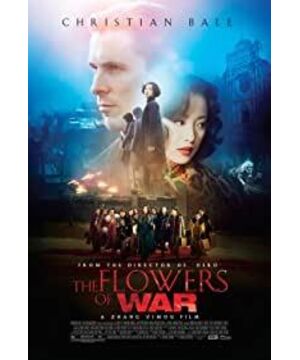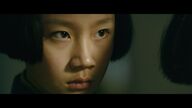2. Intertextual texts: The film is obviously involved in the huge discourse production surrounding the Sino-Japanese War and the Nanjing Massacre. The most recent related texts are obviously [Nanjing Nanjing] and [Rabe Diary]; And form an intertextual relationship with [Women in Berlin]. The treatment of certain passages in this film is reminiscent of last year's Cannes Jury Prize film [Man and God]. And the handling of the war scene is obviously Spielberg [Saving Private Ryan] and HBO [Band of Brothers] (especially the third episode). Putting aside the Sino-Japanese War and the Nanjing Massacre for the time being, the following texts clearly contain such strategies: 1) Some kind of issue that can be called "universal value" rather than "China-specific", which is manifested in religious, The handling of the images of Americans and Japanese, as well as the choice of language (the matter of the church school is still related to [Nanjing Nanjing]); 2) The language system of the war film opened through [Assembly Number] rather than the theme of revolutionary history, including the scenery , handheld photography, editing methods, etc. This time even the American team was included. 3) The vision is no longer domestic or the so-called "global Chinese", otherwise, where will the 100 million US dollars be received.
3. The image of the Japanese: It is very interesting that the character of Hasegawa obviously borrows a certain way of portraying the Nazis in European films: they understand art (there are also examples in Chinese films, such as [Red Cherry]). If one thinks that [Nanjing Nanking] and [Iwo Jima Letters] are some kind of writing that de-demonize the Japanese (very interestingly, the de-demonized Japanese are weak, quiet, and inactive soldiers: Kadokawa, and The role played by Kazuya Ninomiya), 13x is some kind of return to traditional writing (of course, Japanese devils understand art in [Farewell My Concubine] [Mei Lanfang].) This issue is very sensitive and difficult to grasp. If you don't get it right, you will end up the same as Lu Chuan.
However, what endorses [Nanjing Nanjing] is the new mainstream ideology of "the rise of great powers" and the specific national strategy of "breaking the ice with culture", and now this narrative has long since gone bankrupt under the impact of the financial tsunami. So in the end, it is more similar to the [Rabe Diary] strategy. However, a fluttering "safe zone is not safe at all" dispelled Rabe's existence.
4. The presence of the United States: This is based on Bell's protagonist position as a metaphor. Of course, this film (starring and special effects team) speaks volumes about the purchasing power of China today. In a sense, the whitewashing is: Bell can become the subject, in addition to the choice of personal morality and the inspiration of religious power, there is still the help of the Chinese. The funny thing is that this is provided by a traitor, and this person is not only forced to be a traitor, but also atones with death.
A little more fun, it's ironic that Bell was going to church to ask for money.
5. Oscar formula: In fact, isn't Bell a "mortician"? Then there's the cat-dog-child rhetoric (ho, why didn't the cat be taken away by the schoolgirls in the end?), and some sort of "Daoist"-looking narrative. The question is where is the real touchpoint of this story?
6. People and Gods: The resisting Chinese troops are often in a kind of iconographic lighting (bright windows in the background), and the two bullets fired by Tong Dawei pass through the stained glass windows. Bell is the most common "priest" who identifies with the role in the play. Choir chants. (Why didn't these female students do their daily evening classes?) The religious component was actually weakened, otherwise it would be more troublesome for Chinese audiences to watch.
But there is a real shadow of [people and gods] in the setting (besieged churches and monasteries in perpetual crisis), moral choices, and "spectacles of ritual."
7. The brothel culture: It's a very detailed resurrection performance, I think it's based on [Flowers on the Sea]. In fact, such as "Peach Blossom Fan" or Liang Hongyu, Xiaofengxian, Sai Jinhua, there are also many heroes in the brothel. But this time, the narrative is very restrained, full of charm, and keeps its promise, and only one person died of "stupidity" (earring). It's really some kind of name.
8. Orientalism: Zhang Yimou went back to the strategy of making his name in the world more than ten years ago. Once again, China is placed in a position of being "watched" in the form of a woman. There are two Chinese men in the film, one is a traitor and the other is a soldier. Interestingly, this soldier is also always looking - through the scope. He was a savior in a sense, but he died early (see Liu Ye in [Nanjing Nanjing]). The boy is genderless and ends up in disguise (not cross-dressing) as a woman. The gender of the female students is only apparent when facing the Japanese, and they are indeed genderless. Both Japanese and Americans are men.
It is not that all Chinese men are dead, so Zhang Yimou has worked hard to establish a new type of subject image about China since [Hero] (such as Zhou Dong in [Golden Armor] and Xiao Shenyang in [Three Guns], see Liu Mr. Fei's discussion of Zhang Yimou's film) collapsed, but in this film, neither Chinese men or women ever occupied the main position. This is a proven and effective narrative strategy.
Let's see how the images of the 14 brothel women are presented: cheongsam, perm; this is even related to [In the Mood for Love], [Lust and Caution] and [Flowers on the Sea], the nostalgia for Shanghai in the 1930s (although this is in Nanjing ). There is nothing more Orientalist rhetoric than a woman's body in a cheongsam.
So the interesting question is whether Orientalism is the only way to gain world recognition and global box office. Fortunately, this time it is finally not martial arts and kung fu (is martial arts oriental?)
9. Narrative: The narrator is one of the female students, and the viewpoint is also strictly limited. This time, it is the "witness" rather than the descendants of these people (like [Red Sorghum], or even [Silver Empire]). The ending is also open ended (no tail). Of course it was abridged (otherwise how would she know that "Instructor Li" was Instructor Li). At the same time, it also means responding to Japan's request to provide "evidence" of the Nanjing Massacre.
10. Narrative: the national army is resisting, this is not a problem; religion, who said that the Chinese have no faith; traitors, that is forced to help; Japanese, still Japanese devils; brothel women, this is the bright spot.
11. So what is this film ultimately defending, it seems to be defending a group of little girls from being raped by Japanese devils, which is somehow a metaphorical way of defending China. The problem is that this happened at the time of the fall of the Chinese capital, so it has to be a symbolic rhetoric. Is it important not to be raped but to be raped by the Japanese? The occupation of brothel women seems to have fully explained this problem. So is Yumo and Bell in love? Obviously not. This logic is really weird. Again, it is due to the nationalist sentiment towards Japan. So they had to interpret this group of female students as a symbol of "hope and future". But the problem is that these female students are not only female students, but English-speaking, international, religious female students, and almost also come from a higher-class background. As a result, the two main groups—prostitute women and female students, basically appear in group portraits, and they are not easy to identify in such a short period of time. Not to mention foreigners—a certain meaning is mixed into class rhetoric (such as clothing, etc.). Contrast, and there is a more intuitive "class rhetoric" than the brothel women hiding in the cellar and the schoolgirls upstairs). Of course it's not a question of who is more qualified to live (it's not a question at all), it's pre-assigned.
Then this question that doesn't seem to need to be discussed becomes a question, why are these brothel women going to sacrifice for the female students. Probably apart from the rhetoric of "children" and some kind of "whitewashing" (too obvious, before they die generously, they have to remove all their image attributes and disguise themselves as "pure schoolgirls"), Because they are lower class and they hardly understand English.
12. Let's go a step further on the issue of "humanism". [Nanjing Nanjing] is probably a bad humanitarianism, so is [Rabe's diary] a good humanitarianism? (Of course, I have already said that Rabe's German director is dealing with the aftermath of the Nazis. This is something that China does not need to be interested in.) Is 13x a good humanitarianism? It seems that the film is really conservative on this issue, almost Taoist (is there anything more moral than playing a priest and becoming a savior). In fact, 13x can really be linked to [Nanjing] [Rabe] (for example, the Japanese occupation of Nanjing ceremony, Lu Chuan filmed, 13x is also mentioned, and it is an important plot driving force), like [Nanjing], Nanjing is also a scene film , of course, is much better than Lu Chuan's scenes, but Nanjing is smaller as Nanjing (only one church and surrounding streets, as well as brothels and Qinhuai River). The humanitarianism of 13x is outside the nationality, but within the nationality, it is obviously not the case: the female students and the brothel girls have been competing, and the brothel girls have not spared no effort to complain about the national army, and Chen George even Not with nationality as the first criterion - he once refused the entry of the brothel women, he followed the instructions of the Nordic priest, and he also refused the entry of Instructor Li because "the Japanese leaflet said that Chinese soldiers should not be harbored". This kind of tension between Chinese people is quite like [the devils are coming].
And when is national identity established? When the Japanese call, when the Japanese rush in, when the Japanese want to take the female students away. There is indeed a need for an absolute Other. But the problem is that the female student and George Chen's national identity is obviously ambiguous (church school). National narratives don't have to be slogans, but at this point, the ambiguity of 13x is really a problem.
13. Summary: Finally, it falls back to some of the apparent details of the film. The most important visual presence was obviously Bell, not only American but literally Oscar incarnate. I still remember the premiere of "Shocking the Oscars" in the Great Hall of the People. Bell's image is nothing more than that of ordinary people who are called into action subjects by position or humanitarianism and dare to take responsibility or something. Second, the dazzling brothel women and a certain visualization of the imagination of "cultural China" are presented again. In terms of hearing, there are not only dialects, but also English (almost half of the dialogue in English, is it enough to qualify for foreign language films), and at the same time language has become a sign of social identity and some kind of justice, elite (protagonist) preexisting Judgment (well-educated senior Japanese officers can also speak English, so the fun is that the traitor's father can speak Chinese, English and Japanese, but he died, but he is obviously a high-class), in the end it is unexpected Of course, it also tells an American "myth" inherent in contemporary Chinese culture. The difference is that this time America is visible and touchable, not something that can only be looked up. The power of capital has become an absolute powerhouse this time.
So the final conclusion is, that's all, is Oscar really that important?
Four additional points:
PS1: George Chen is obviously a low-class child (a child picked up by Father Ingman), which is the reason why he finally died in place of the female students. As for the strength of the brothel women, this is mainly due to some kind of body politics between adults and children. Of course, they take the initiative to occupy the cellar because they can only live in the cellar.
PS2: Japanese is clearly fully unjust. Those who speak Japanese are bad people. Bell had Japanese on that flag before, but put it away when he decided to take responsibility. Bell never spoke Japanese (other than mentioning the officer's name). Another interesting point is that the Japanese songs sung by the officers do not have subtitles.
PS3: To a certain extent, these female students have inherited the legacy of the brothel women. One of the funniest appearances is when the schoolgirls left with the lute instead of the cat. The "cultural China" symbolized by the pipa has been passed down in a sense. "Bequest" is a very typical scene of national inquiries. There is a very interesting transcendence of class here. And the scene discussed by many film critics—the subjective lens of fourteen women in costumes on the catwalk—just illustrates this “cultural China” problem. At this point, it is obviously no longer the rectification of "business women also know the hatred of subjugation", but the culture represented by these women has been inherited by the girls who are about to become women.
PS4: I think this film finally appeals to some audiences: those born in the 1980s and 1990s who understand English, this film tells them that they can communicate with Bell (United States) if they understand English, and can be saved by him. This is the biggest politics of the day.
View more about The Flowers of War reviews










